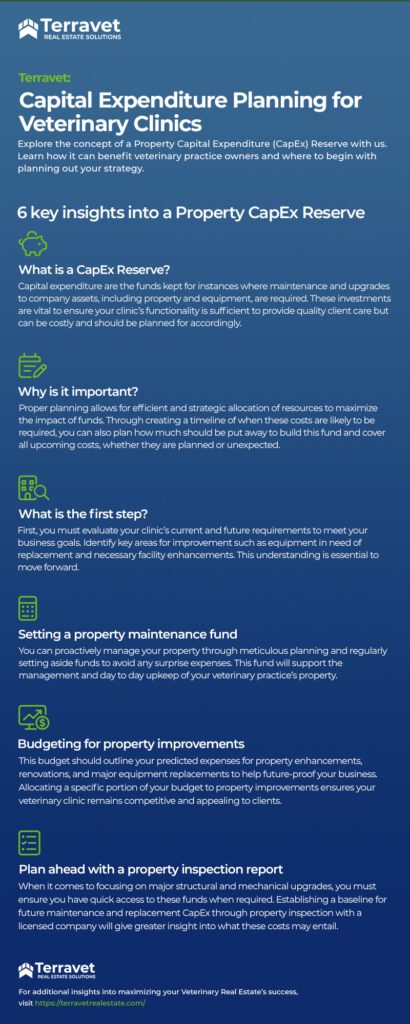As a veterinary practice owner, you know the importance of maintaining a well-equipped and efficiently run clinic. To ensure the longevity and success of your practice, it is essential to consider long-term property management and capital expenditures. Explore the concept of a property capital expenditure (CapEx) reserve with us and learn how it can benefit veterinary practice owners.
What is capital expenditure for veterinary clinics?
Effective capital expenditure planning is the cornerstone of financial success for any veterinary clinic. Capital expenditures are the funds that contribute to maintaining and upgrading company assets, including property and equipment, which are vital for your clinic’s functionality and client services. Proper planning allows for efficient and strategic resource allocation to maximize the impact of funds.
Beginning your capital expenditure budgeting plan
The first step in CapEx planning is to evaluate your clinic’s current needs and requirements to help it meet its business goals and objectives. Identify key areas for improvement, such as equipment that needs replacement and facility enhancements. Prioritize these needs and create a comprehensive plan outlining when these investments are expected to be made. This roadmap will help you manage your resources effectively and ensure that your veterinary practice is well-equipped to provide quality care to patients.
Setting up a property maintenance fund
Establishing a property maintenance fund is crucial to the management and day-to-day upkeep of your veterinary practice’s property. This fund is kept in reserve to address ongoing maintenance, repairs, and improvements. You can proactively manage your property by regularly setting aside funds and meticulously planning to avoid any surprise expenses.
Start by determining what is affordable to allocate to your property maintenance fund. This amount should also take into consideration the age and condition of your clinic’s facilities, as well as your long-term property improvement goals. Having a designated fund ensures you are prepared to address maintenance needs promptly, keep your clinic in top condition, and prevent deferred repairs that would be costly to your budget and the clinic’s reputation.
Property improvement budget for vet practices
Creating a property improvement budget is fundamental to your clinic’s financial strategy. This budget should outline your predicted expenses for property enhancements, renovations, and major equipment replacements. When you allocate a specific portion of your budget to property improvements, you ensure that your veterinary clinic remains competitive and appealing to clients.
Determine which areas of your property require upgrades or modifications. This could include enhancements to the waiting area, renovations for the examination rooms, or investing in the latest medical equipment. Establishing a budget for these improvements can help you allocate your resources strategically. This in-depth planning will make prioritization and execution of property enhancements easier over time.
Plan with a property inspection report
While renovations and property enhancements are the more exciting side of CapEx plans, it is essential not to neglect major structural and mechanical upgrades. Once these components are deemed unfit for purpose, they will need to be replaced promptly.
Establishing a baseline for future maintenance/replacement CapEx by conducting a property inspection with a licensed company will give greater insight into what these costs may entail. The Inspector will tour the building, gather information, and schedule estimated timeframes and costs to replace the property’s structural and mechanical components over the next 10+ years. This level of expertise will give much-needed insight into the appropriate dollar reserve to set aside to meet these future capital replacement requirements.
Start prioritizing your veterinary practice’s capital expenditure
Capital expenditure planning should undoubtedly be at the forefront of creating a strategy to ensure the financial success of your veterinary clinic. This planning can address significant investments in your property and equipment. Such strategic planning is essential to establish efficient resource allocation and prevent unexpected financial strains to secure your clinic’s long-term financial health.
Contact us for additional insights into maximizing your Veterinary Real Estate’s success.
For our 6 key insights at a glance, check out our infographic:




